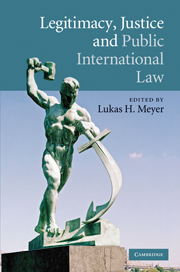Book contents
- Frontmatter
- Contents
- List of contributors
- Acknowledgements
- Introduction: Legitimacy, justice and public international law. Three perspectives on the debate
- 1 The legitimacy of global governance institutions
- 2 Institutionalising global demoi-cracy
- 3 The responsibilities and legitimacy of economic international institutions
- 4 Do international organisations play favourites? An impartialist account
- 5 ‘Victors’ justice'? Historic injustice and the legitimacy of international law
- 6 International law and global justice
- 7 Global justice: Problems of a cosmopolitan account
- 8 The responsibility to protect human rights
- 9 The threat of violence and of new military force as a challenge to international public law
- 10 Forcing a people to be free
- Index
- References
5 - ‘Victors’ justice'? Historic injustice and the legitimacy of international law
Published online by Cambridge University Press: 03 May 2010
- Frontmatter
- Contents
- List of contributors
- Acknowledgements
- Introduction: Legitimacy, justice and public international law. Three perspectives on the debate
- 1 The legitimacy of global governance institutions
- 2 Institutionalising global demoi-cracy
- 3 The responsibilities and legitimacy of economic international institutions
- 4 Do international organisations play favourites? An impartialist account
- 5 ‘Victors’ justice'? Historic injustice and the legitimacy of international law
- 6 International law and global justice
- 7 Global justice: Problems of a cosmopolitan account
- 8 The responsibility to protect human rights
- 9 The threat of violence and of new military force as a challenge to international public law
- 10 Forcing a people to be free
- Index
- References
Summary
Thomas Nagel has recently written, ‘We do not live in a just world. This may be the least controversial claim one could make in political theory.’ Nowhere does this seem more clear than in the field of international justice. In recent years, political theorists have put forward a range of accounts of how international society should, ideally, be ordered. Whilst there is disagreement as to what a just world would look like, defences of the justice of the status quo are few and far between. Even those writers who deny that redistributive duties of justice extend across state borders and who believe that it is appropriate that peoples take responsibility for the results of their own decision-making typically accept the existence of transnational duties to ensure minimal levels of wellbeing for the world's poor – duties which, tragically, are clearly not being fulfilled in the present day. Such judgments as to the injustice of the real world international situation, however, do not necessarily extend to present-day principles of international law, which contain at least formal provisions for the fulfilment of minimal socio-economic rights, whilst privileging ideas of national responsibility and self-determination. In this chapter, I consider the relation between the injustice of contemporary international society and the legitimacy of international law. The chapter is motivated by the thought that the existing international legal system is unfair.
- Type
- Chapter
- Information
- Legitimacy, Justice and Public International Law , pp. 163 - 185Publisher: Cambridge University PressPrint publication year: 2009
References
- 4
- Cited by



